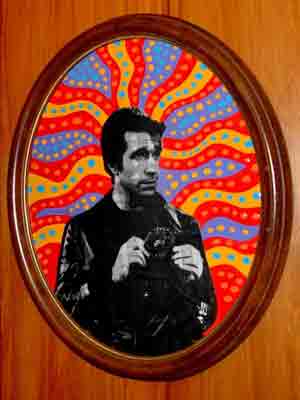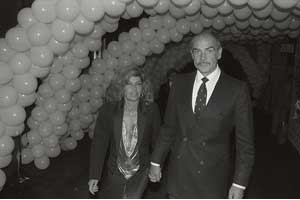How to Keep a Cool Head
5 tips to keep you calm, unruffled, and effective even when life gets tough
 "How to Keep a Cool Head" courtesy of geoftheref
"How to Keep a Cool Head" courtesy of geoftheref"They called me 'Mr Cool'. I was the guy that diffused live bombs. I was totally calm, detached, and professional before, during, and after an operation. But all I can say is I've lost my cool."
I was intrigued. It didn't look as if a bomb had actually gone off anywhere near him. "So what happened, Ron? What changed? How did you lose that cool?"
"I know exactly what happened!" Ron looked angry. "I went to couples therapy with my wife, as we were having difficulties. The therapist decided I needed to get in touch with my feelings. We both told her that wasn't really the issue. Anyway, I got so in touch with my feelings that I couldn't continue to do the job I loved. I need to work again and I need my cool head back; at least when I'm working."
A bomb disposal expert too in touch with his feelings! Another victim of the over-generalized idea, 'emotional expression = good; emotional control = bad'.
But what does it mean to be cool?
On being cool
It's cool to be cool, but the word itself has morphed to mean any number of things, from being fashionably dressed to owning the 'right' material possessions to anything you happen to like - as in: "Yeah, I'm cool with that!" But if you are being 'cool' toward me, then the word means being distant, not friendly. And, of course, the original meaning relates to relative temperature.
Okay, let's get specific: What do we mean by keeping a cool head?
How to keep a cool head amidst a load of hotheads
By 'cool' I mean unflappable, self-contained, gracious, brave, having 'grace under fire', being calm and collected. Ron had been well known for his cool-headedness. Anyone (okay, most people) can be cool when things are easy, but I want to talk about that extra level of extraordinary poise and self-possession that some people display during difficulties, even emergencies. How do they do it? Here are a few ideas:
1) Decide to respond, not just react
Emotion is a kind of fuel that propels us to act (note the 'motion' within 'emotion'). But if we keep 'flooding the system', we can suffer 'emotional over-heating'. Keeping a cool head doesn't mean having no emotion; it means having just the right amount for optimum performance.
When we need to handle situations (a difficult person, a presentation, an emergency, a bomb!), then we need to ensure we run a cool engine with just the right amount of 'fuel'.
When we lose our cool, we stop thinking properly. Emotions like fear or anger swamp the neo-cortex - the bit inside your skull that retains logic, detachment, and strategic thinking. Next time you catch yourself 'losing it', say to yourself: "Okay, what are my options here? How do I really want to respond?"
2) Get out of touch with your emotions
Back in the '70s, it was trendy to get in touch with your emotions, to 'let it all hang out'. It was seen as 'healthy' to be emotional; that the root of neurosis stemmed from 'blocked emotion'.
But actually, so many psychological problems occur and are maintained because emotions run rampant.
See, the mass assumption was that if you don't feel an emotion, then you are 'suppressing it'. But if you react with terror on seeing a spider and I react with calm, then I am not 'suppressing' my fear; I'm just not having any. Being cool isn't about bottling up emotion that is there; it has more to do with being master of the option of whether to have the emotion or not. But how can we do this?
3) Develop your observing self
Errr.. what now? My observing what?!
Arthur Deikman, MD coined the term 'observing self' (1). We all have an observing part of ourselves that just observes from an ultimate point of detachment, but it gets clouded when emotions run rampant. We could liken it to the difference between being at sea in the middle of a terrifying storm and watching that sea storm from the safety of the distant shore.
When you become angry, lustful, terrified, there is a small part of you that can observe these emotions running through you. You are not totally the emotion, because a part of you is outside of it. The great mystic Rumi described emotions as 'house guests' (2) that stay a while, then leave. They affect us, but they are separate from us. The 'us' they are separate from is the observing self.
To develop your observing self is not the same as being 'cold and detached', because you can even observe yourself being cold and detached. It's the 'ultimate point of observation' and is often equated to quasi-mystical states. I asked Ron how it had felt to be 'Mr Cool'. He described how it was as if a part of him watched from the outside. On one level, sometimes he'd feel fear but "on another level I'd be outside of that fear - just watching it - and so it would diminish."
I myself have found that when speaking to hundreds of people there are 'risks' such as making jokes (the sound of two hundred people not laughing can be deafening). But a part of me is on the 'outside' of the situation, just observing; so cracking jokes that might not work doesn't feel like a risk.
Think about times when you're more likely to lose your cool and practice just observing yourself in these times 'from the outside'.
4) Think cool thoughts
Think cool thoughts whenever you feel your emotions are trying to 'hijack' you.
The more emotional you become, the more extreme your thinking becomes. But it can also work in reverse: The less extreme your thinking, the calmer you can feel. It's not a chicken or the egg cause and effect thing; it's more of a two-way street or feedback loop.
Examples of 'extreme thought' produced by strong emotion:
- "This is going to be a disaster!"
- "This person is perfect!"
- "I'm just a loser!"
- "I'm going mad!"
- "I'm going to be ruined!"
- "I'm going to make a complete fool of myself!"
Now: Practice modifying your thought when you catch yourself using extremist thought.
- "Bits of this may not go so well and some of it will be fine."
- "I love this person, but no one is perfect."
- "I'm feeling emotional at the moment, but I'm not going to go mad!"
- "Things will be tough for a while."
- "People will think what they'll think!"
- "This is a dangerous explosive device but I am a world expert and very well trained!"
Depressed people tend to use 'extremist thinking' much of the time ("I'm going to be forever unloved/alone.") and become exhausted through such 'hot thinking'. Learn to think cool.
5) Don't always be cool headed
It's not cool to always be cool. Let your hair down, have fun, feel emotion when it's useful. It's not that we need to be totally out of touch with our emotions; stay in touch, but also have boundaries, because emotions do like to try and run the whole show. I may want to be 'in my observing self' when dealing with an emergency or talking to hundreds of people, but I want to be fully in touch with my feelings whilst watching a comedy film or having a wonderful meal.
Ron and I worked together over three sessions. We looked at his background stress levels to ensure he had the 'spare capacity' to have a cool head when he was working, we used hypnosis to re-evoke those 'Mr Cool' times, and we talked about his marriage and how it had improved now that he was "in the driving seat" as far as his emotions were concerned.
Ron decided he hadn't lost his cool, just temporarily misplaced it - and now it was back.
References
- See: The Observing Self: Mysticism and Psychotherapy by Arthur J. Deikman, 1992.
- See "The Guest House" by Jalaluddin Rumi.






